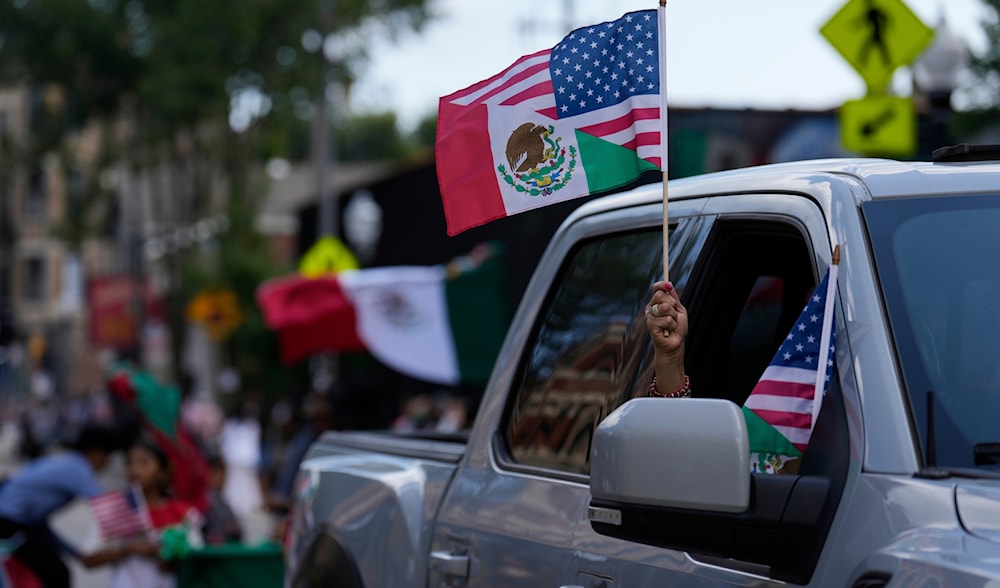ICE fears empty Chicago’s Mexican independence parade
The 2025 Mexican Independence Day Parade in Chicago's Pilsen neighborhood saw low turnout as fears of ICE raids and Trump's aggressive immigration policies discouraged participation.
-

Participants wave flags as they take part in the 2025 Pilsen Mexican Independence Day parade Saturday, September 6, 2025, in Chicago. (AP Photo/Carolyn Kaster)
The Mexican Independence Day Parade in Chicago's Pilsen neighborhood, once a vibrant and joyous celebration, unfolded in 2025 under a cloud of fear and uncertainty. Traditionally marked by twirling folklórico dancers, mariachi music, and large, festive crowds, Reuters reported that this year’s event was noticeably subdued. Attendance was drastically lower, and the mood was somber.
Volunteers handed out "know your rights" pamphlets instead of candies, and some parade participants wore neon-orange whistles to alert others in case Immigration and Customs Enforcement (ICE) agents appeared. "This place would normally be packed," Eddie Chavez told Reuters, a lifelong Pilsen resident. "Now it's empty, like a ghost town."
US President Donald Trump has made Chicago a central focus of his second-term immigration crackdown. In early September, Trump deployed federal agents to Naval Station Great Lakes, roughly 50 miles north of the city, using it as a logistical hub for expanded ICE operations.
On September 6, he posted an image on Truth Social that showed him in military attire with flames in the background and the Chicago skyline, quoting, "I love the smell of deportations in the morning... Chicago is about to find out why it's called the Department of WAR."
The administration's strategy included a 30-day immigration operation named "Patriot 2.0," combining ICE and Customs and Border Protection (CBP) agents. Illinois Governor JB Pritzker condemned the move, labeling it an attempt to "terrorize" Latino communities by deliberately aligning raids with cultural celebrations like Mexican Independence Day.
Community response to threats
Despite the fear, many in the community refused to be silenced. Dancer Isabel Garcia, dressed in a marigold-yellow folklórico outfit, spoke to Reuters, "We're scared, but we're here... We're Mexican. We have to celebrate, and they're not going to stop us."
Along the parade route, volunteers kept vigilant watch for federal agents, and organizers adopted emergency protocols. Though ICE did not officially comment on an increased presence, many attendees feared a repeat of past raids. A large protest against ICE was planned for later that day, following thousands who demonstrated during Labor Day.
Cultural celebrations canceled nationwide
Chicago was not alone in its altered festivities. Across the US, fears of immigration raids have led to the cancellation or downsizing of numerous Latino cultural events:
- El Grito Chicago, which expected 25,000 attendees, was canceled.
- The Cinco de Mayo parade in Little Village, typically drawing 300,000 people, was called off after 45 years.
- El Carnaval de Puebla in Philadelphia and Latino Fest in Oregon were also canceled due to safety concerns.
Racial profiling and the arrest of legal residents
A key driver of community fear is the growing body of evidence showing that immigration enforcement is not limited to undocumented individuals. ICE data reveals that one in five street arrests target Latinos with no criminal background or removal order.
Legal immigrants and even US citizens have been wrongfully detained or deported. For example, ICE deported 70 potential US citizens between 2015 and 2020. A Florida-born citizen, Leonardo Garcia Venegas, was detained because agents claimed his real ID was fake. Meanwhile, Andrea Velez, a 32-year-old US citizen, was tackled by ICE agents and falsely accused of assault. Additionally, George Retes, a disabled veteran, was held for three days after being tear-gassed during a raid.
Local and state resistance builds
Governor Pritzker and Chicago Mayor Brandon Johnson have taken steps to resist federal overreach. Pritzker denounced the raids as an "invasion" and signaled that Illinois would not cooperate with federal enforcement efforts.
Mayor Johnson signed an executive order prohibiting city police from collaborating with National Guard personnel or federal immigration agents. He also mandated that federal agents wear body cameras and avoid face masks to ensure accountability.

 4 Min Read
4 Min Read










